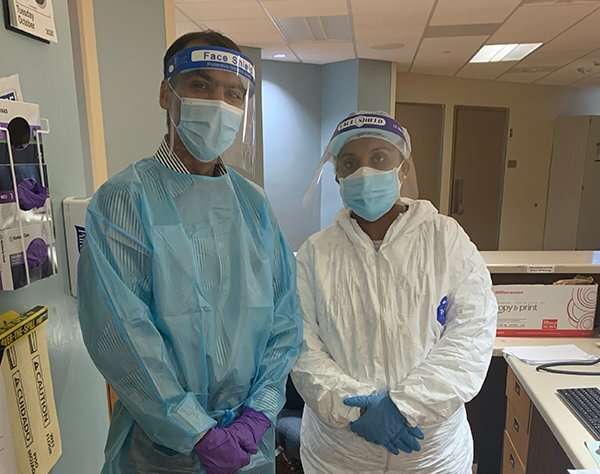Providing a safe environment for psychiatric patients during pandemic

The very heart of inpatient care for psychiatric patients is socialization, group therapy, shared meals, and a standard two people per room. Then COVID-19 hit with the accompanying public health warnings to isolate, socially distance, and wear masks.
That sent clinicians and staff from The University of Texas Health Science Center at Houston (UTHealth) moving quickly to create a strategy for the UTHealth Harris County Psychiatric Center (UTHealth HCPC) that provided the best psychiatric care within a safe environment in the middle of an epic pandemic. That strategy was published in the October issue of Psychiatry Research.
“When COVID-19 began, we were left with the question of how to manage a highly infectious virus in a freestanding psychiatric hospital. There was no existing published guideline on how to do this,” said first author Lokesh Shahani, MD, MPH, assistant professor in the Louis A. Faillace, MD, Department of Psychiatry and Behavioral Sciences at McGovern Medical School at UTHealth and chief medical officer of UTHealth HCPC.
The largest provider of inpatient psychiatric care in the Greater Houston area, the center is a 274-bed, safety-net hospital that provides care to around 9,000 patients each year. It is led by Executive Director Jair C. Soares, MD, Ph.D., senior author of the paper, and Pat R. Rutherford, Jr. Chair in Psychiatry in the Faillace Department of Psychiatry and Behavioral Sciences.
By mid-March, with rising Harris County cases, hospital leaders realized that the chances of a patient arriving who was infected with COVID-19 were rapidly growing.
“Our mission is to treat patients in the community who have psychiatric conditions and we didn’t want to turn anyone away,” said Stephen Glazier, COO of the hospital. “The only way to do that was to create an isolated COVID-19 unit.”
To create the space, new patients were not admitted to that unit and remaining patients were moved into other units as spots became available. Glazier asked for volunteers willing to staff the unit day and night. Shahani, who is board certified in infectious disease as well as psychiatry, decided to lead the infection control initiative.
“I am honored to work alongside our dedicated nursing staff who stepped up and volunteered to take care of our COVID-19 patients,” Shahani said. “Staff safety was our priority and we made sure everyone was trained in appropriately using PPE and had access to the same.”
The team turned for advice and leadership from co-author Luis Ostrosky, MD, professor of infectious diseases at McGovern Medical School, and vice chair of Healthcare Quality at McGovern Medical School. “We had to keep staff safe as well as patients,” Shahani said. “Being a part of UTHealth and able to consult with Dr. Ostrosky was invaluable for us.”
Ostrosky is the COVID-19 Incident Commander for UTHealth. “COVID-19 continues to challenge the way we work. Knowledge acquisition and flexibility have been key in making changes and adapting to our new reality,” Ostrosky said. “From transporting patients in helicopters, to figuring out waiting rooms, to making psychiatric care safe, UTHealth is here for our community’s needs.”
Complicating the process for the team were patients who refused to be tested for the coronavirus or understand why they had to wear a mask.
“In a medical hospital, patients are able to have a private room with attached bathroom, which we don’t have, and they are tested for the virus. Psychiatric patients don’t always consent for testing because of their severe mental illness, and 40% refused testing,” Shahani said. “Wearing a face mask and adhering to hand hygiene are other measures needed to keep people safe, but people with chronic severe mental illness don’t have the ability to always follow guidelines such as that.”
The team decided to focus on screening for symptoms, fever, contact, and travel history. They used extreme caution: anyone who was suspected of having the virus was isolated.
The first test for the new unit came April 17 when an asymptomatic patient required isolation because of recent travel and exposure. Since then, over 100 patients have been treated in the COVID-19 unit, with 52% of them testing positive for the virus.
“We’ve had community partners who needed a safe place to treat patients and we have been able to step in and accept these patients,” Shahani said. “We have been safely delivering psychiatric care during the pandemic.”
Source: Read Full Article


